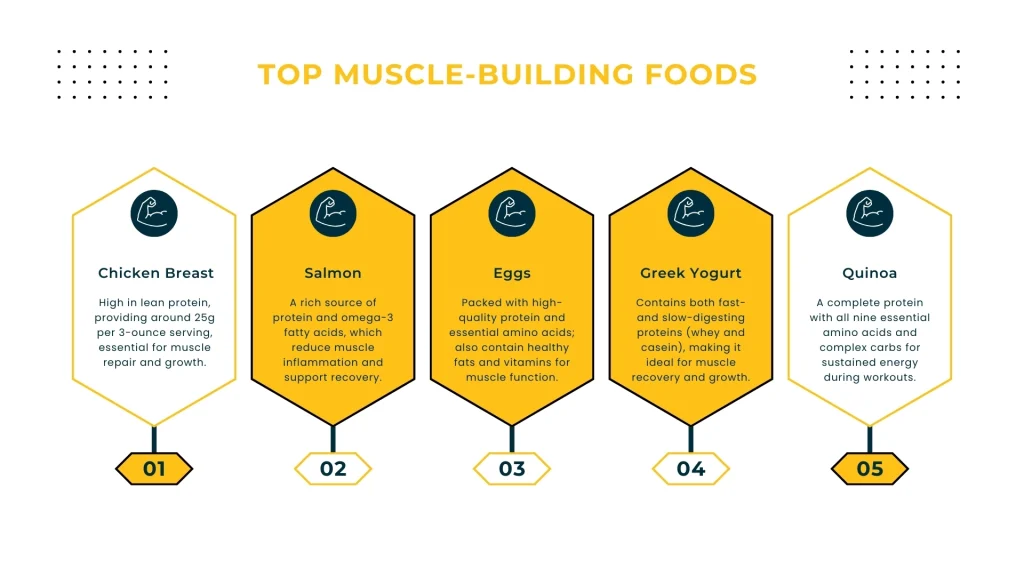Building lean muscle requires more than just hitting the gym; it demands a well-rounded approach that includes proper training and, crucially, a nutrient-dense diet. In this comprehensive guide, we’ll explore the best muscle-building foods that can supercharge your gains, providing a foundation for the best diet for muscle growth. Whether you’re a seasoned bodybuilder or just starting your fitness journey, incorporating these powerhouse foods into your diet can optimize muscle growth and overall performance.
Protein Powerhouses: Best Diet for Muscle Growth
Protein serves as the building blocks for muscle growth and repair, making it an essential component of any muscle-building diet. Protein powerhouses encompass various food sources rich in this macronutrient, supporting the development and maintenance of lean muscle mass, and form a crucial part of the best diet for muscle growth.
- Lean Meats: Lean meats like chicken breast and turkey are renowned for their high protein content with lower amounts of saturated fats, making them ideal choices for those aiming to increase muscle mass while controlling fat intake. Lean meats such as beef, pork, and lamb are excellent sources of high-quality protein, essential for muscle repair and growth. They also provide vital nutrients like iron and zinc.
- Poultry: Chicken and turkey are rich in protein and low in fat, making them ideal for muscle building. They are also versatile and can be prepared in various ways to keep your meals interesting.
- Fish: Fish like salmon, tuna, and mackerel are not only high in protein but also packed with omega-3 fatty acids, which help reduce muscle inflammation and support recovery. Fish, such as salmon and tuna, are not only excellent protein sources but also contain omega-3 fatty acids, promoting joint health and aiding in muscle recovery post-exercise, thus making them essential components of the best diet for muscle growth.
- Eggs: Eggs are a complete protein source, meaning they contain all the essential amino acids needed for muscle growth. They are also rich in vitamins and minerals, such as B vitamins and choline. Eggs, considered a complete protein, offer a spectrum of amino acids vital for muscle repair and growth, further emphasizing their significance in supporting muscle development.
Dairy Products
Dairy products like milk, cheese, and yogurt are excellent sources of protein and calcium. Greek yogurt, in particular, is high in protein and can be a great addition to your diet.
Plant-Based Proteins
For those following a plant-based diet, options like beans, lentils, chickpeas, tofu, and quinoa are rich in protein and essential nutrients, supporting muscle growth and repair.

Carbohydrates for Energy
Carbohydrates play a pivotal role in fuelling energy levels, especially during high-intensity workouts and aiding in post-exercise recovery. They serve as the primary energy source for the body, supporting muscle function and overall physical performance.
- Complex carbohydrates, unlike simple sugars, provide a steady and sustained release of energy, playing a crucial role in the best diet for muscle growth. Foods like whole grains, such as brown rice, quinoa, oats, and whole wheat bread, offer a rich source of complex carbohydrates.
- These foods digest slowly, ensuring a continuous supply of energy throughout workouts and aiding in replenishing glycogen stores post-exercise, making them essential for supporting muscle function and recovery.
- Additionally, starchy vegetables like sweet potatoes and legumes such as chickpeas and beans are excellent sources of complex carbohydrates.
- They not only contribute to energy levels but also offer other nutrients like fiber, vitamins, and minerals, enhancing overall health and supporting muscle recovery.
- Balancing carbohydrate intake is essential. While they provide energy, excessive consumption, especially from refined or processed sources like sugary snacks and white bread, can lead to spikes in blood sugar levels and potential fat storage.
- Therefore, opting for complex carbohydrates that provide sustained energy without causing rapid fluctuations in blood sugar is key in supporting muscle energy needs and overall performance.
Healthy Fats and Omega-3s
Healthy fats, particularly omega-3 fatty acids, are vital components of a balanced diet for muscle growth. They contribute to overall health and support muscle growth and recovery. Omega-3s play a significant role in reducing inflammation, enhancing joint health, and promoting optimal muscle function, making them crucial elements in the best diet for muscle growth.
Sources rich in omega-3s include fatty fish like salmon, mackerel, and sardines, along with plant-based options like flaxseeds, chia seeds, and walnuts. These foods offer a potent dose of essential fatty acids, aiding in muscle repair and reducing exercise-induced inflammation, which can improve recovery post-workout.
Incorporating healthy fats into your diet not only supports muscle health but also assists in nutrient absorption. Fat-soluble vitamins such as vitamins A, D, E, and K require healthy fats for absorption, ensuring optimal utilization of these nutrients for overall health and muscle function.
Avocados, olive oil, and nuts, especially almonds and walnuts, are additional sources of healthy fats. They provide a combination of monounsaturated and polyunsaturated fats, promoting heart health and aiding in maintaining proper hormone function, which is crucial for muscle growth and repair.
Micronutrients and Nutrient-Dense Foods
Micronutrients, comprising essential vitamins and minerals, are integral to overall health and play a vital role in supporting muscle function, recovery, and growth. Nutrient-dense foods packed with these micronutrients are essential for optimal performance and well-being.
Hydration and Recovery
Hydration is a critical aspect of muscle recovery and overall athletic performance. Water plays a crucial role in various bodily functions, including nutrient transportation, temperature regulation, and waste removal. Adequate hydration supports muscle function during workouts and aids in the recovery process afterward. While discussing the best nuts for muscle growth, it’s important to highlight that maintaining proper hydration levels is fundamental for optimal muscle recovery and overall physical performance.
After intense physical activity, especially workouts aimed at building muscle, the body loses fluids through sweat. Replenishing these lost fluids by drinking water is essential to prevent dehydration, which can negatively impact muscle recovery and performance.
Sweat leads to the loss of electrolytes like sodium, potassium, and magnesium. Rehydrating with electrolyte-rich beverages or sports drinks helps restore the body’s electrolyte balance, supporting proper muscle function and preventing muscle cramps or fatigue.
Proper hydration post-exercise facilitates nutrient delivery to muscles, aiding in the repair of damaged tissues and replenishing glycogen stores, which are essential for muscle recovery. Additionally, staying hydrated supports joint health and flexibility, reducing the risk of injuries during workouts.
Monitoring hydration levels and maintaining consistent water intake throughout the day, beyond just during workouts, is crucial for optimal muscle recovery and overall well-being. Balancing hydration with electrolyte replenishment is vital for efficient recovery, aiding muscles to recover faster and enhancing overall performance, showcasing the importance of hydration in the best nuts for muscle growth.
Best Nuts for Muscle Growth
Nuts are an excellent snack choice for anyone looking to build muscle. They are packed with protein, healthy fats, and essential vitamins and minerals that support muscle repair and growth. Here are some of the best nuts for muscle growth:
- Almonds: Almonds are rich in protein, providing about 6 grams of protein per ounce. They are also high in vitamin E, an antioxidant that aids in muscle recovery and reduces oxidative stress after workouts.
- Walnuts: Walnuts contain omega-3 fatty acids, which help reduce inflammation and promote better recovery between workouts. They also offer a decent amount of protein and are great for overall heart health, which is important when maintaining an active lifestyle.
- Cashews: Cashews are not only high in protein but also contain magnesium, which is essential for muscle contractions and relaxation. Magnesium helps reduce muscle cramps and enhances muscle recovery after intense exercises.
- Peanuts: While technically legumes, peanuts are often classified with nuts and are fantastic for muscle growth. With about 7 grams of protein per ounce, they are one of the most protein-dense nuts. Peanuts also contain B-vitamins, which help convert food into energy and aid muscle function.
- Pistachios: Pistachios are lower in calories compared to other nuts, making them a great option if you want a protein boost without overloading on fats. They contain about 6 grams of protein per ounce and are also rich in fiber, which is beneficial for digestion and nutrient absorption.
Essential Carbohydrates
Whole Grains
Whole grains such as brown rice, quinoa, oats, and whole wheat bread provide complex carbohydrates that offer sustained energy for workouts and recovery.
Fruits
Fruits like bananas, berries, and apples provide quick energy, essential vitamins, and antioxidants that help combat exercise-induced oxidative stress.
Vegetables
Vegetables are packed with vitamins, minerals, and fiber, essential for overall health and muscle recovery. Leafy greens, sweet potatoes, and bell peppers are particularly beneficial.
Legumes
Beans, lentils, and peas are excellent sources of both protein and complex carbohydrates, making them ideal for muscle building and sustained energy.
Healthy Fats for Muscle Growth
Nuts and Seeds
Nuts and seeds such as almonds, walnuts, chia seeds, and flaxseeds are rich in healthy fats, protein, and fiber. They support overall health and provide a calorie-dense snack option.
Avocado
Avocado is a nutrient-dense fruit high in healthy monounsaturated fats, which support heart health and provide energy for muscle-building activities.
Olive Oil
Olive oil is rich in monounsaturated fats and antioxidants, promoting overall health and aiding in reducing muscle inflammation.
Fatty Fish
Fatty fish like salmon and mackerel are excellent sources of omega-3 fatty acids, which help reduce muscle soreness and promote recovery.
Vitamins and Minerals for Muscle Building
Calcium
Calcium is essential for muscle contraction and bone health. Dairy products, leafy greens, and fortified plant-based milks are good sources.
Magnesium
Magnesium plays a role in muscle function and energy production. Sources include nuts, seeds, whole grains, and leafy green vegetables.
Vitamin D
Vitamin D supports calcium absorption and bone health, which are vital for muscle function. Sun exposure, fortified foods, and fatty fish are good sources.
Iron
Iron is crucial for oxygen transport to muscles. Lean meats, beans, lentils, and fortified cereals are rich sources of iron.
Hydration and Muscle Health
Importance of Water
Staying hydrated is crucial for muscle function and overall health. Water helps transport nutrients to muscles and remove waste products, ensuring optimal performance and recovery.
Electrolytes
Electrolytes like sodium, potassium, and magnesium are essential for maintaining fluid balance and muscle function. They can be replenished through a balanced diet and hydration drinks.
Meal Timing and Frequency
Pre-Workout Nutrition
A balanced meal or snack rich in carbohydrates and protein consumed 1-2 hours before a workout provides the energy needed for optimal performance.
Post-Workout Nutrition
Consuming protein and carbohydrates within 30 minutes to 2 hours after a workout helps replenish glycogen stores and supports muscle repair and growth.
Sample Muscle-Building Meal Plan
Breakfast:
- Oatmeal with Protein Powder: 1 cup of oats cooked with water or milk, mixed with a scoop of whey or plant-based protein powder.
- Eggs: 3-4 scrambled or boiled eggs.
- Fruit: 1 banana or a handful of berries.
Mid-Morning Snack:
- Greek Yogurt: 1 cup of Greek yogurt with honey and a sprinkle of nuts or seeds.
- Almonds: A handful of almonds (about 1 oz).
Lunch:
- Grilled Chicken Breast: 6-8 oz of grilled chicken breast.
- Quinoa or Brown Rice: 1 cup of cooked quinoa or brown rice.
- Steamed Vegetables: A variety of steamed vegetables like broccoli, spinach, or kale.
Afternoon Snack:
- Cottage Cheese: 1 cup of low-fat cottage cheese.
- Apple or Pear: 1 medium-sized apple or pear.
- Peanut Butter: 1 tablespoon of natural peanut butter.
Dinner:
- Salmon or Lean Beef: 6-8 oz of grilled salmon or lean beef.
- Sweet Potato: 1 medium-sized baked sweet potato.
- Mixed Green Salad: A large mixed green salad with olive oil and vinegar dressing.
Evening Snack:
- Casein Protein Shake: 1 scoop of casein protein mixed with water or milk.
- Mixed Berries: A handful of mixed berries.
Hydration:
- Drink plenty of water throughout the day (at least 8-10 glasses).
- Include a post-workout shake with fast-digesting carbs and protein, such as a banana with a whey protein shake.
Additional Tips:
- Meal Timing: Consume meals every 3-4 hours to keep your body fueled and promote muscle recovery.
- Protein Intake: Aim for 1.6 to 2.2 grams of protein per kilogram of body weight daily.
- Carbohydrate Intake: Ensure you consume enough carbohydrates to fuel your workouts and promote muscle recovery.
- Healthy Fats: Include sources of healthy fats like avocados, nuts, seeds, and olive oil in your diet to support overall health.
This diet plan provides a balanced mix of macronutrients to support muscle growth and recovery, ensuring that you get the most out of your training efforts.
30 Muscle-building foods
Here’s a list of muscle-building foods that can provide essential nutrients for muscle growth:
- Eggs: Provide high-quality protein and essential amino acids for muscle synthesis.
- Chicken Breast: A lean source of protein that’s versatile in recipes.
- Turkey: High in protein and low in fat, perfect for various dishes.
- Greek Yogurt: Offers a good amount of protein with probiotics for gut health.
- Cottage Cheese: Rich in protein and calcium for bone health.
- Salmon: Packed with protein and omega-3 fatty acids, beneficial for muscle maintenance.
- Tuna: A lean protein source also rich in omega-3 fatty acids.
- Milk: Provides hydration, protein, and calcium.
- Jerky: A portable, high-protein snack ideal for on-the-go.
- Whey Protein Powder: Useful for increasing protein intake conveniently.
- Soy Protein Powder: A plant-based protein option.
- Lean Beef: High in protein and essential minerals like iron and zinc.
- Edamame: A plant-based protein that’s also rich in fiber.
- Quinoa: Offers a complete protein profile with all essential amino acids.
- Chickpeas: Excellent source of protein and fiber.
- Brown Rice: Provides carbohydrates and pairs well with proteins for a complete amino acid profile.
- Tofu: A versatile plant-based protein rich in calcium.
- Seeds: Sunflower and pumpkin seeds are high in protein and healthy fats.
- Seafood: Includes shrimp and lobster, rich in protein and omega-3 fatty acids.
- Peanuts: High in protein and magnesium, which may enhance exercise performance.
- Walnuts: Provide protein and omega-3 fatty acids.
- Buckwheat: A gluten-free seed high in protein and fiber.
- Lean Pork: Rich in protein and potentially improves body composition.
- Bison: A healthier alternative to beef with lower cardiovascular risks.
- Lentils: A fiber-rich protein source ideal for plant-based diets.
- Beans: Kidney, black, and navy beans are good sources of protein and fiber.
- Almonds: A nutritious snack providing protein and fiber.
- Cheese: High in protein; opt for lower-fat versions to reduce saturated fat intake.
- High-Protein Cereals: Offer a quick, protein-enriched breakfast option.
- Soy Milk: A dairy-free milk alternative rich in protein.
Conclusion
Incorporating the best diet for muscle growth involves a balanced approach that addresses macronutrients, and hydration. Whether you’re focusing on protein-packed meals, energy-providing carbohydrates, healthy fats, or nutrient-dense foods, a well-rounded diet is key to achieving and sustaining muscle gains. Experiment with various foods, listen to your body, and make adjustments based on your individual needs.




